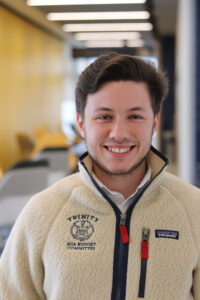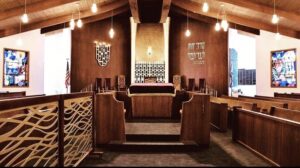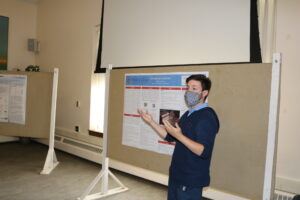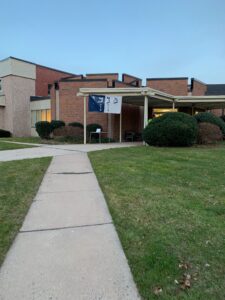Joshua Jacoves ‘23 Researches What Community Means to Hartford’s Modern Orthodox Jewish Community

In the summer of 2021, Joshua Jacoves set out to explore what it means to be a part of the modern Orthodox Jewish community. His research project, “Reimagining Yiddishkeit,” sponsored by the Kelter Fund at the Center for Urban and Global Studies (CUGS), sets out to answer the questions: What does it mean to be part of a religious community? How is it built? What are the spaces which encompass it? When coming into Trinity, Jacoves knew he wanted to do community research. As an anthropology major, he also knew he always wanted this research to be fieldwork and hands on.
After conducting research this past summer, Jacoves is now organizing the interviews, observation notes, and surveys he gathered. In summer 2022, he will continue to participate in the Shul and gather data, and will finish his research with his thesis in 2023 in time for his graduation. He also has been chosen to present his research at the Society for Applied Anthropology’s yearly conference.
“One of the reasons I chose Trinity is that I knew there was a plethora of opportunities to do research and I knew that there were a lot of places at Trinity that may fund that research. Now that I’m here, through the help of both CUGS and the Faculty Research Committee, I have been able to have my research expenses covered. That is something I very much appreciate.”
Jacoves’s inspiration for this research came after attending the funeral for his great uncle, who was very involved with his local synagogue. He became curious about the impact of his great uncle in this community. Somehow hundreds of people in this network through the synagogue spoke about his great uncle like he was family. This is what sparked the inspiration for the research project to delve into and explore the ways in which this tight knit community is built, particularly through place and geography.
In the beginning of the process, Jacoves’s first goal was to gain the trust of the community by attending services three times a week during Shabat (The Sabbath, a period of rest lasting from Friday at sundown to Saturday at sundown). After a month he started to gain the trust of others and the Rabbi let him introduce himself to the community. One moment that was particularly important to this process for Jacoves was three weeks into his research when the Rabbi invited him to the Sheva Brachot (Seven Blessings) where a just married couple has a series of meals after their wedding, and one new member of the community is always invited. Jacoves showed up knowing no one. He scanned the room and found an older woman to offer his help setting up to. The woman turned out to be the bride’s grandmother, and introduced him to many of the guests. From this experience, Jacoves is still in contact with them and conducted interviews with some of them. He gained confidence with the community and to move forward with his research. A challenge, however, is trying to respect this barrier as an outsider, and finding balance with wanting to give back to the community as much as possible. In solution, Jacoves gives his time and offers help whenever he sees an opportunity, such as watching the synagogue members’ children after service.

Through ethnographic interviews, surveys, and attending Shul (שול : Temple, Synagogue), Jacoves gathered valuable insight into more of the nuances of what encompasses the strong Modern Orthodox Jewish community. Before going into the research, Jacoves had taken anthropology courses learning about the role of place in cultivating community. He had a basic knowledge of how living in the same vicinity impacts the way the community functions. Through his first phase of research, however, he learned more about the secondary locations of socialization which strengthen the bonds of the community beyond the Shul. Due to the kosher diet, for example, grocery stores are another hub of community. Another interesting dynamic Jacoves learned about which is more currently impacting the Modern Orthodox Jewish community is safety. In the wake of synagogue shootings in the United States, there are now new roles and practices in the community, such as a security committee, children being separated from their parents during services, and being searched before entering the Shul. This has impacted how people participate in the community, such as a security guard may be attending service less, and mothers may want to remain with their children instead of attending service with the rest of their family. Jacoves also noted the role of men versus women in his observations, interviews, and surveys.

While Jacoves did not grow up in a religious community, he had a basic understanding of community through his own involvement growing up. He reflects that he now sees more clearly that “there is community mapped in the streets” and there are many “intentional things to make sure that community is maintained and extend the community past the physical space of the synagogue.” His understanding of religion has also widened, where he sees it as a “spectrum of different aspects of spirituality.” The synagogue is not just a space of prayer, but a space of community. Some people

Jacoves spoke to were there to pray, while others were there for the socialization after. This does not change the importance of either. The Modern Orthodox community is not just about prayer, but food, family, heritage, and culture.
Joshua Jacoves is also the president of Hillel at Trinity. Since he did not grow up religiously Jewish, he shares his growth and depth of understanding through his research. Before he would be lost in the Hillel services, and now he can help lead them. While not necessarily religious himself, he sees it as a special way to connect with his ancestors as they may have been speaking the same words and prayers as he does today.
For others interested in pursuing anthropological research at Trinity, Jacoves recommends and is grateful for taking anthropology courses, methods courses, his time at the Liberal Arts Action Lab as a review for methods and research, the Community Action Gateway community and professors, and the patience and time of many professors for answering his questions and talking through ideas.
